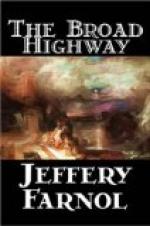“Peter,” exclaimed the baronet, striding up and down, “Peter, you are a fool, sir, a hot-headed, self-sufficient, pragmatical young fool, sir, curse me!”
“I am sorry you should think so,” I answered.
“And,” he continued, regarding me with a defiant eye, “I shall expect you to draw upon me for any sum that—that you may require for the present—friendship’s sake—boyhood and—and all that sort of thing, and—er—oh, damme, you understand, Peter?”
“Sir Richard,” said I, grasping his unwilling hand, “I—I thank you from the bottom of my heart.”
“Pooh, Peter, dammit!” said he, snatching his hand away and thrusting it hurriedly into his pocket, out of farther reach.
“Thank you, sir,” I reiterated; “be sure that should I fall ill or any unforeseen calamity happen to me, I will most gladly, most gratefully accept your generous aid in the spirit in which it is offered, but—”
“But?” exclaimed Sir Richard.
“Until then—”
“Oh, the devil!” said Sir Richard, and ringing the bell ordered his horse to be brought to the door, and thereafter stood with his back to the empty fireplace, his fists thrust down into his pockets, frowning heavily and with a fixed intentness at the nearest armchair.
Sir Richard Anstruther is tall and broad, ruddy of face, with a prominent nose and great square chin whose grimness is offset by a mouth singularly sweet and tender, and the kindly light of blue eyes; he is in very truth a gentleman. Indeed, as he stood there in his plain blue coat with its high roll collar and shining silver buttons, his spotless moleskins and heavy, square-toed riding boots, he was as fair a type as might be of the English country gentleman. It is such men as he, who, fearless upon the littered quarterdecks of reeling battleships, undismayed amid the smoke and death of stricken fields, their duty well and nobly done; have turned their feet homewards to pass their latter days amid their turnips and cabbages, beating their swords into pruning-hooks, and glad enough to do it.
“Peter,” said he suddenly.
“Sir?” said I.
“You never saw your father to remember, did you?”
“No, Sir Richard.”
“Nor your mother?”
“Nor my mother.”
“Poor boy—poor boy!”
“You knew my mother?”
“Yes, Peter, I knew your mother,” said Sir Richard, staring very hard at the chair again, and I saw that his mouth had grown wonderfully tender. “Yours has been a very secluded life hitherto, Peter,” he went on after a moment.
“Entirely so,” said I, “with the exception of my never-to-be-forgotten visits to the Hall.”
“Ah, yes, I taught you to ride, remember.”
“You are associated with every boyish pleasure I ever knew,” said I, laying my hand upon his arm. Sir Richard coughed and grew suddenly red in the face.
“Why—ah—you see, Peter,” he began, picking up his riding whip and staring at it, “you see your uncle was never very fond of company at any time, whereas I—”




